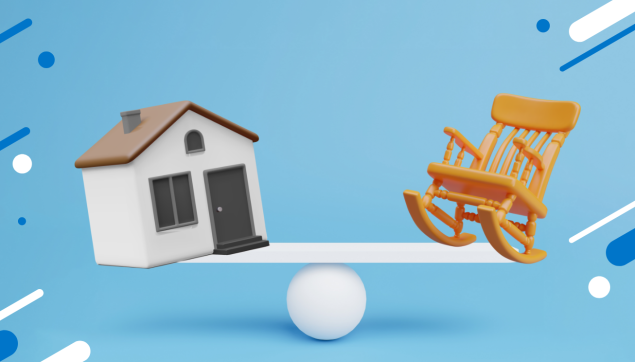Should you prioritise home loan freedom over retirement contributions?

Last updated on 3rd May, 2024 at 01:36 pm
Paying off a home loan is one of the most important goals that homeowners have, but so is saving for a comfortable retirement. In times when finances are tight, it is tempting to consider focusing on one over the other.
Reading time: 5 minutes
In this article you’ll learn:
- The benefits of contributing to a retirement fund
- Potential long-term savings when paying off a home loan
- Questions to ask yourself about your savings habits
Eliminating debt as quickly as possible to gain financial freedom is important, but so is saving as much as you can for your retirement. The dream, after all, is to retire with your house paid off so that you can enjoy your golden years fully.
So then, is there a benefit in prioritising the one over the other in the long term? Let’s explore.
The numbers view
Most people that are saving towards retirement, invest in a ‘balanced fund’, which is well diversified and provides good growth potential without taking too much risk. A retirement fund also comes with various tax and estate planning benefits.
After fees of an estimated 2%, you can probably expect growth of CPI + 3% over the long term. That’s inflation, plus 3%. This aspect of retirement savings is important when doing a like-for-like comparison against home loan interest.
In the high interest-rate environment at the time of writing, in order to understand the best place for your money to grow, Jan Steenkamp, Chief Executive: Sanlam Retail Credit, compares the growth you would get by maximising your RA savings versus opting to pay off your home loan:
| Assumptions:
Inflation (CPI) ≈ 6% Prime interest = 11.75% |
Retirement annuity | Home loan
(at prime interest rate) |
| Growth rate | CPI + 3% =~ 9% | 11.75% (interest saved) |
| Difference | =2.75% | |
What this means for you
If you choose to settle your home loan, you’re effectively saving or ‘earning’ what you would’ve paid in interest (11.75% at the time of writing) and at a higher rate than the growth you can expect to earn on your retirement savings (9%).
“These are real, guaranteed returns that you get on the money that you pay off because you save the interest you would have had to pay to the bank,” says Steenkamp.
This comes with a critical caveat: a property is not a replacement for retirement savings.
Should you choose to pay off your home loan, this should be in conjunction with regular contributions to retirement savings.
Steenkamp adds that windfalls like unexpected work bonuses or inheritances should ideally be used to pay off your home loan sooner.
Home loan freedom vs retirement security
Any decision you make needs to consider all advantages and limitations of each option, beyond comparing interest rates:
| Pay off home loan first | Contributing to RA first | ||
| Advantage | Limitation | Advantage | Limitation |
|
|
|
|
Retirement fund vs home loan: the human element
Say you were to settle your home loan, with that extra cash, how disciplined would you be to put that money into a retirement fund going forward?
The temptation may be to spend it or even buy a new, better home. Even though this is another way to build wealth, it effectively translates to consumption: you get used to a higher standard of living, not an asset that would give you cash to live from in retirement.
Being honest with yourself about your own financial discipline and relationship with money is key to making your decisions work for you.
There’s also the consideration of your dependants.
“Ultimately, the more people you have that are dependent on you, the more certainty you need and the less risks you can take,” says Steenkamp. With this in mind, from a diversification perspective, a retirement fund would be the obvious choice.
It’s clear that a few factors play a role in making a decision like this, key being:
- Interest rate cycles
- Your own financial discipline and risk appetite
- Your dependants’ needs
- Your tax profile
“If you are disciplined and won’t spend the equity that you’ve built up in your property, then pay off your debts as soon as you can, and then increase your retirement savings,” Steenkamp says.
“In practice, most people don’t have that financial discipline, so they need to be protected from themselves, putting money away where it can’t be easily accessed, since the temptation for the ‘now’ almost always trumps the need to provide for the future.”
Returning to the question of whether or not you should prioritise home loan freedom over retirement contributions, Steenkamp says “there is no single answer to this conundrum”. The decision is highly personal and is influenced by the dynamics that are specific to your household.
Key to doing what is right for you and your loved ones is research, honesty and sound financial advice from a qualified professional.
Want to learn more?
We send out regular emails packed with useful advice, ideas and tips on everything from saving and investing to budgeting and tax. If you're a Sanlam Reality member and not receiving these emails, update your contact details now.
Update Now







